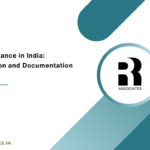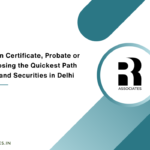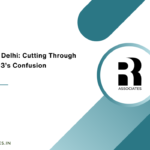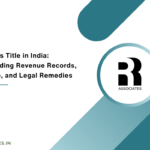
At R Associates, we specialize in civil, commercial, criminal, constitutional, and regulatory litigation across Indian courts—from trial courts to the Supreme Court. Our seasoned litigators bring unmatched depth, drawing from decades of experience in both domestic and cross-border disputes.
Our Litigation Services
Criminal & White-Collar Defence
Constitutional & Writ Litigation
Regulatory & Tribunal Litigation
Emergency Reliefs
The Litigation Process at R Associates
- Pre-Litigation Advisory
In-depth case assessment, risk analysis, forum selection, and documentation review, including notices and legal notice drafting. - Filing & Pleadings
Carefully drafted plaints, written statements, interim relief applications (e.g. injunctions under CPC Order 39). - Evidence & Argumentation
Strategic evidence collection, witness preparation, oral testimony, and written submissions. - Interim Relief & Injunctions
Swift pursuit of stay orders, injunctions, and emergency assistance. - Trial & Appeal
Effective cross-examination and appeals (first, second appeals, SLPs) in High Courts and the Supreme Court. - Execution & Enforcement
Assistance with decree execution, appointing receivers, and enforcing domestic/foreign judgments.
Why This Matters
Authority
Trust & Experience
Relevance
FAQ
The litigation process in India typically begins with a legal notice (in civil or commercial matters), followed by the filing of a plaint or written complaint before the appropriate court. After admission of the suit, the other party is served with summons and allowed to file a written statement. The matter then proceeds to framing of issues, evidence, arguments, and final judgment. Depending on the case, appeals or revisions may be filed before higher courts. An experienced litigation lawyer in Delhi can help you navigate each stage efficiently.
The duration of civil litigation in India varies based on the complexity of the case, the jurisdiction, and court workload. On average, a civil case may take 2 to 5 years at the trial level, with appeals adding more time. However, courts now offer fast-track procedures and alternate dispute resolution (ADR) methods such as mediation to reduce timelines. At R Associates, we adopt proactive litigation strategies to help reduce avoidable delays.
Commercial litigation includes disputes arising from contracts, partnerships, shareholder agreements, service or supply failures, intellectual property, construction, and business torts. It often involves complex documentation, jurisdictional issues, and urgent reliefs like injunctions. Our firm regularly represents clients in commercial suits across High Courts and commercial divisions, making us a trusted commercial litigation firm in India.
Yes. If there is a threat of irreparable harm, courts can grant urgent stay orders or temporary injunctions to prevent the transfer of property, demolition, or unauthorised construction. Relief is generally sought under Order XXXIX Rules 1 & 2 of the Code of Civil Procedure (CPC). Our team has extensive experience in obtaining such emergency reliefs in High Courts and district courts across Delhi NCR and beyond.
Litigation involves procedural compliance, evidentiary rules, strategic pleadings, and legal argumentation, all of which require legal expertise. A qualified litigation lawyer in Delhi or other relevant jurisdiction ensures that your case is presented with precision and supported by appropriate citations, documents, and oral submissions. Moreover, lawyers can help secure interim reliefs, protect your rights, and handle appeals effectively—something that’s difficult to do without formal training.
Why R Associates for Litigation?
Expertise Across Court Levels
Proven Track Record
Strategic Approach
Satisfied Client Stories
Challenges and Opportunities in the Indian Arbitration and Dispute Resolution Landscape
As the Indian economy continues to grow at a rapid pace, it has become an attractive destination...
Navigating India’s Renewable Energy Policies: A Comprehensive Guide for Foreign Investors
India is one of the fastest-growing economies in the world, with an ever-increasing demand for...
Tribunal Lacks authority to negotiate or establish New Agreements on behalf of Parties
Supreme Court Overrules APTEL Judgment, Asserts Regulatory Commissions Cannot Overstep Express...
Navigating the Virtual Playground: Online Gaming in India
As the Indian economy continues to grow at a rapid pace, it has become an attractive destination...
CERC allows Power Exchanges to charge a transaction fee up to the ceiling limit of 2 paisa/kWh from either party to the transaction
Implications and Background of CERC's Decision on Transaction Fee Limits for Power Exchanges...
The Significance of Right-to-Know Regulations in Addressing Workplace Safety Issues
In the dynamic landscape of contemporary workplaces, a comprehensive understanding of...
Paper or Partition? When Family Settlements Must Be Registered
Families divide property all the time. Sometimes it’s an oral bargain at the puja; sometimes...
Who Manages Your Crypto, Wallets, and Logins After You’re Gone? The Case for a Digital Executor in India
Succession planning in India has long revolved around physical property, bank accounts, and...
NRI Inheritance in India: Repatriation and Documentation
For many Non-Resident Indians (NRIs), inheriting property or financial assets in India brings a...
Succession Certificate, Probate or LoA? Choosing the Quickest Path for Banks and Securities in Delhi
When a person passes away, leaving behind bank deposits, shares, bonds, or other securities, the...
Probate in Delhi: Cutting Through Section 213’s Confusion
When someone passes away leaving behind a Will, the natural question is: Do you need probate to...
Mutation vs Title in India: Understanding Revenue Records, Ownership, and Legal Remedies
Mutation vs title in India” is a distinction that trips up buyers, heirs, and even banks....
Get in Touch
If you would like to speak with someone directly
Call Us
011-40743543







